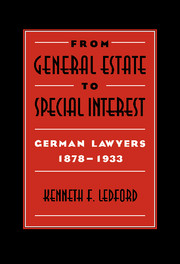Book contents
- Frontmatter
- Contents
- List of Illustrations
- Hierarchy of Courts
- Glossary of Legal and Other Terms
- Abbreviations
- Preface
- 1 The Archimedean Point: Lawyers, Liberalism, and the Middle-Class Project
- 2 Freie Advokatur: The Blending of the Middle-Class and Professional Projects
- 3 Foundation of the Modern Profession: The Private Bar under the Lawyers' Statute
- 4 Institutional Framework: Lawyers and Honoratiorenpolitik
- 5 Growth and Diversification: Lawyers in the Province of Hannover, 1878–1933
- 6 Elites and Professional Ideology: Self-Discipline and Self-Administration by the Anwaltskammer Celle
- 7 Simultaneous Admission: The Limits of Honoratiorenpolitik
- 8 The Limits of Economic Liberalism: Freie Advokatur or Numerus Clausus?
- 9 The Limits of Political Liberalism: Lawyers and the Weimar State
- 10 Conclusion: Lawyers and the Limits of Liberalism
- Methodological Appendix
- Bibliography
- Index
9 - The Limits of Political Liberalism: Lawyers and the Weimar State
Published online by Cambridge University Press: 11 September 2009
- Frontmatter
- Contents
- List of Illustrations
- Hierarchy of Courts
- Glossary of Legal and Other Terms
- Abbreviations
- Preface
- 1 The Archimedean Point: Lawyers, Liberalism, and the Middle-Class Project
- 2 Freie Advokatur: The Blending of the Middle-Class and Professional Projects
- 3 Foundation of the Modern Profession: The Private Bar under the Lawyers' Statute
- 4 Institutional Framework: Lawyers and Honoratiorenpolitik
- 5 Growth and Diversification: Lawyers in the Province of Hannover, 1878–1933
- 6 Elites and Professional Ideology: Self-Discipline and Self-Administration by the Anwaltskammer Celle
- 7 Simultaneous Admission: The Limits of Honoratiorenpolitik
- 8 The Limits of Economic Liberalism: Freie Advokatur or Numerus Clausus?
- 9 The Limits of Political Liberalism: Lawyers and the Weimar State
- 10 Conclusion: Lawyers and the Limits of Liberalism
- Methodological Appendix
- Bibliography
- Index
Summary
Beyond the experiences of the internal professional struggles over simultaneous admission and freie Advokatur, and the resort to external legislative power to resolve them, German lawyers during the 1920s entered into yet a third set of complex contingent relations with the state that demonstrated the declining power of their liberal professional structure and practice to protect the interests either of individual lawyers or the bar as a whole. Under the Weimar Republic, lawyers encountered for the first time a political system that challenged the comfortable relations that the private bar had established with government bureaucracies, particularly the state and Reich ministries of justice, in the interest of greater substantive justice for other segments of society and for society as a whole. At the same time that bureaucracies became more responsive to other social groups, lawyers experienced a decline in the legislative strength of the liberal parties with which they had traditionally been allied. Through a series of very specific political defeats, the German bar during the Weimar Republic reached the limits of the power of political liberalism to support its self-image as the general estate, reinforcing the conclusion that its liberal professional structure faced only further paralysis and irrelevance in the future.
During the Second Empire (1871–1918), the German bar maintained comfortable relations with the monarchical state. Legislation that affected the profession emerged from the Imperial Office (later Ministry) of Justice, although most of the drafting occurred in the Prussian Ministry of Justice.
- Type
- Chapter
- Information
- From General Estate to Special InterestGerman Lawyers 1878–1933, pp. 275 - 290Publisher: Cambridge University PressPrint publication year: 1996



